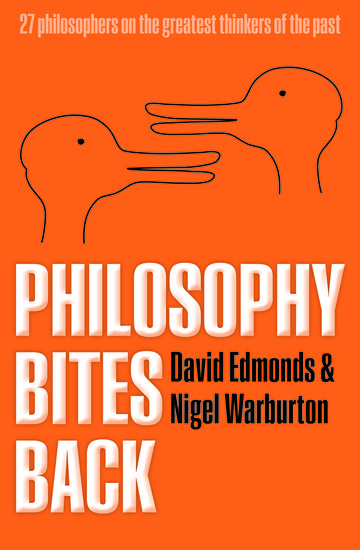By David Edmonds
PB. The initials are not exactly as familiar as, say, BBC or NPR, but we’re not operating in a massively different environment. PB: Philosophy Bites.
Time was when to broadcast on the radio (or the ‘wireless’) you’d have to seek a license for permission to use a teeny weeny portion of the radio frequency spectrum. Broadcasting was time-consuming, bureaucratic, and above all expensive. It required staff and costly equipment and it was possible only with the support of highly-trained studio technicians and engineers.
No longer. The Philosophy Bites podcasts are recorded on a five-inch tape recorder in various offices (usually in Oxford or London) and edited on a laptop in a small (and unkempt) bedroom in North West London. Since it was launched five years ago, it’s had 15 million downloads. It is heard all over the world – in San Francisco, Tokyo, London and Sao Paolo – and its followers include professors, journalists, farmers and at least one American soldier stationed in Afghanistan (thanks for your email, Sir).
My background is in broadcasting, though I have an academic post. PB co-founder, Nigel Warburton, is a bona fide academic and makes successful forays into the media. We’re both passionate about philosophy, and Philosophy Bites tries to combine our skills and interests. But we’re essentially dependent on the knowledge and eloquence of our interviewees: we’ve conducted 200 interviews now – and by far the most rewarding aspect of our PB experience has been the free education we’ve received from some of the most significant philosophers in the English-speaking world.
And we have some advantages over traditional media. We can focus on our niche, the stuff we know about; we can post interviews when we like, and our interviews can be as long as we like – and as long as they deserve to be. There’s no red tape, and we’re not saddled with the broadcasters’ procrustean burden of cutting programmes to finish exactly on the pips at the top of the hour.
All this poses a threat to traditional media. If an increasing number of specialized podcasters cover their specialized topic as well or better than any general broadcaster can manage, audience figures for the powerful players will be slowly chipped away. They’ll probably have to focus on areas in which the minnows can’t compete — newsgathering, say, or live sporting events. But it’s good news for listeners — Philosophy Bites is part of a new landscape of content, provided by enthusiasts. CNN, BBC, NBC, ABC, and CBC will all survive, thankfully. But for the miniscule world of philosophy, another set of initials is on the scene: PB.
Here are a few of our most recent podcasts:
Or you can search the full back-catalogue, categorised by month and by topic.
David Edmonds is an award-winning documentary maker for the BBC World Service and a Research Associate at the Uehiro Centre for Practical Ethics at Oxford University. Nigel Warburton is Senior Lecturer in Philosophy at the Open University. They are co-authors of Philosophy Bites (OUP, 2010) and Philosophy Bites Back (OUP, 2012), which are based on their highly successful series of podcasts. You can also follow @philosophybites on Twitter.
Subscribe to the OUPblog via email or RSS.
Subscribe to only philosophy articles on the OUPblog via email or RSS.
View more about this book on the ![]()
![]()
Podcast: Play in new window | Download
Subscribe: RSS


[…] -Adding a bit of academic flare to the podcast news coverage is none other than Oxford University Press Blog with their write up for Philosophy Bites Back […]